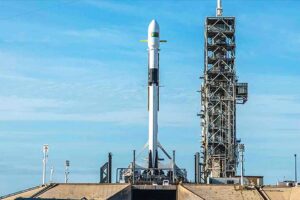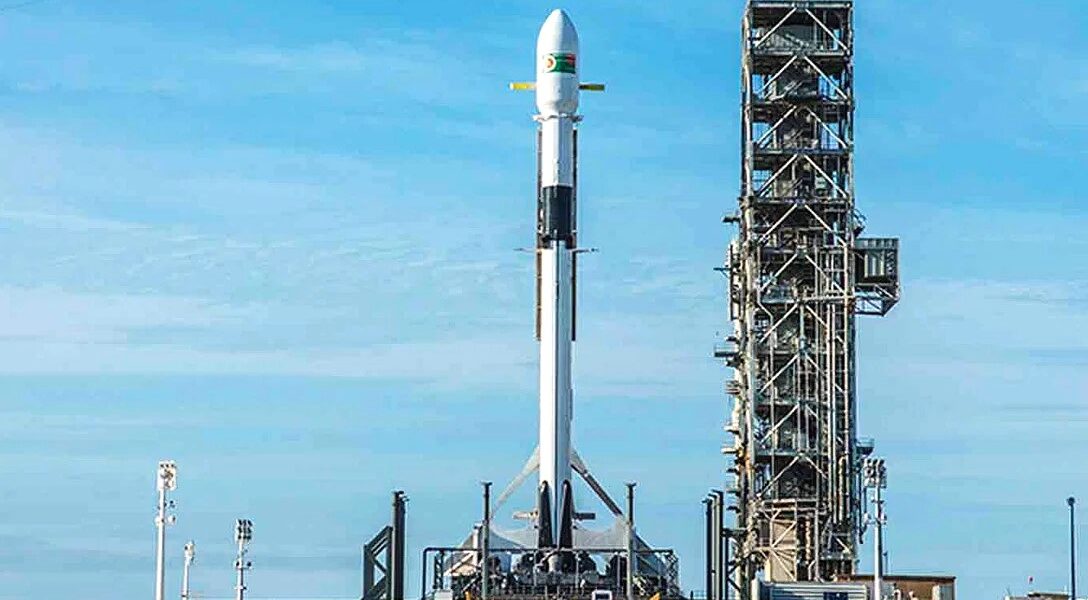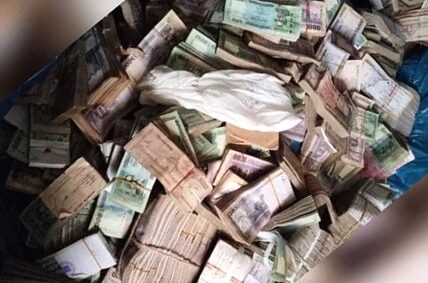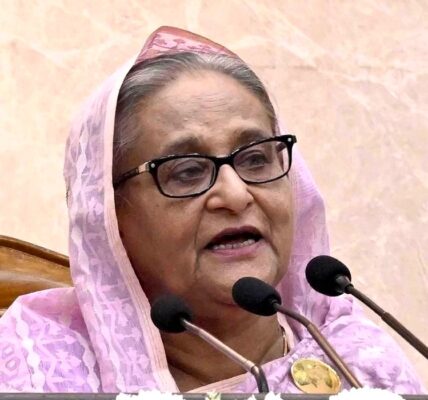Bangabandhu satellite loss of Tk 66 crore per year
- Bangabandhu Satellite-1 was launched in 2018 at a cost of around 3 thousand crore rupees.
- Complexity in selling services due to design.
- Prior to the launch, it was necessary to coordinate frequencies with various countries. It was not done.
- BSCL has not made a profit in any of the financial years under audit so far.
Suhada Afrin
Dhaka
Share it
follow

Satellite Bangabandhu–1 File photo: SpaceX Twitter page
Bangabandhu Satellite’s expenditure is much higher than its income. As a result, the Bangladesh Satellite Company Limited (BSCL), the government organization operating the satellite, is at loss. Although in ‘strategy’ they show themselves profitable.
According to BSNL’s latest audit report (2021-22), the company’s profit is Tk 85 crore. However, the depreciation of the satellite is not taken into account in this computation of profit. If depreciation is found, the loss instead of profit will be around 66 crore rupees. In the previous financial year too, there was almost a similar amount of loss.
In the profit and loss account, year-on-year depreciation has to be shown against the fixed assets. Let’s say the price of a car is 10 lakhs. It can be used for 10 years. Then the depreciation of the car will be 1 lakh per year.
The tenure of Bangabandhu satellite is 15 years. Its asset value is shown as 2 thousand 784 crores. As a result, annual depreciation (straight line method) stands at around 186 crores.
However, the audit report of BTRC in the same financial year did not show any assets for the Bangabandhu satellite. Shown in previous fiscal years. In FY 2021-22, BTRC has shown depreciation against satellite assets.
The Bangabandhu satellite was launched in 2018 through a Bangladesh Telecommunication Regulatory Commission (BTRC) project. On January 31, 2022, its ownership was transferred to the new company BSCL. This company was formed to operate the satellite. Their audit report (2021-22) did not show depreciation against satellite assets. Income from satellites is shown. As a result, the profit of the company stood at 85 crores. However, taking into account the depreciation of Tk 186 crore, BSCL made a loss (Tk 66 crore) in that financial year.
BSCL was audited by SF Ahmed & Company. According to their report, BSCL has not mentioned the full details of satellite assets in their asset statement. BSCL argued that BTRC had not transferred the asset value of the satellite from their asset statement. The audit firm also said that non-disclosure of asset value of satellites could affect the interpretation of BSNL’s asset statements.
However, the audit report of BTRC in the same financial year did not show any assets for the Bangabandhu satellite. Shown in previous fiscal years. In FY 2021-22, BTRC has correctly shown depreciation against satellite assets.
In the same financial year, BTRC showed a depreciation of Tk 186 crore on asset value of satellites. BTRC’s revenue that year was about Tk 4,400 crores. As a result, depreciation on satellites has not had much impact on BTRC’s income and expenditure.
Delister News on the audit report of BSCL Opinions of three Chartered Accountants have been obtained. All three said BSCL appears to be a profitable company due to no depreciation. If depreciation is found then the company will be treated as loss making in the respective financial year.
Humayun Kabir, former president of the Institute of Chartered Accountants of Bangladesh (ICAB), told Daily Star News. He said that the audit institute has given a disclosure (announcement) about the matter in their report. Without showing the depreciation of the assets from which the company earns its income, the true financial picture does not emerge.
It should be noted that not only in the 2021-22 financial year, BSCL has not made profit in any financial year under audit so far. It is doubtful whether he can do it in the coming years. Because their income is much less than their expenses.
Six years of satellites
Bangabandhu satellite was developed by Thales Alenia Space of France. Bangabandhu Satellite-1 was launched in May 2018 from the Kennedy Space Center in Florida, USA. On that day, a government delegation was present at the Kennedy Space Center, including then Prime Minister Sheikh Hasina’s information technology advisor Sajeeb Wazed Joy, former state minister Tarana Halim, and Junaid Ahmed.
Sheikh Hasina thanked and congratulated all concerned immediately after the successful launch of the satellite. He said, ‘The Bangladesh flag flew in space today. From today we are also proud members of the satellite club.
Through the Bangabandhu satellite, the name of Bangladesh has been added to the club of satellites as the 57th country. At that time, various benefits including foreign exchange earnings were mentioned by the government through the satellite. On the other hand, some questioned the necessity of launching a satellite at a cost of around 3000 crore rupees.
Profit and loss accounts of BSCL were kept secret from the beginning. After the fall of the Awami League government in the student uprising on August 5, BSCL sent the audit report for the financial year 2021-22 when the income and expenditure accounts of Bangabandhu Satellite were sought. On behalf of the institution, it is said that the audit report of the completed financial years 2022-23 and 2023-24 has not been prepared yet.
BSCL is an institution under the Ministry of Posts and Telecommunications. The adviser of this ministry is Nahid Islam. BSCL presented its activities in a meeting in the presence of Nahid Islam on September 3. There is also an account of revenue income. But profit and loss information is not provided.
All in all, the degradation of Bangabandhu satellite is showing as BTRC cable. On the other hand BSCL is considered as a profitable company due to not showing that depreciation. However, the cost of launching satellites does not add up to the project finance and day-to-day costs.
How much income
According to BSCL’s audit report for the financial year 2021-22, the total income of the company has been Tk 130 crore. In the previous financial year it was 129 crore rupees. Almost all of the revenue comes from selling bandwidth to private television channels in the country and some foreign channels.
Satellite is not included in the list of fixed and current assets in BSCL’s asset statement. Depreciation is shown as Rs.2 crore, which is on other assets of the organization, not on satellites. However, in the same financial year, BTRC showed a depreciation of Tk 186 crore on asset value of satellites. BTRC’s revenue that year was about Tk 4,400 crores. As a result, depreciation on satellites has not had much impact on BTRC’s income and expenditure.
All in all, the degradation of Bangabandhu satellite is showing as BTRC cable. On the other hand BSCL is considered as a profitable company due to not showing that depreciation. However, the cost of launching satellites does not add up to the project finance and day-to-day costs.
The loss was sought from BALL’s former chairman and chief executive officer (CEO) Shahjahan Mahmood, who quit the company on September 5. He told Daily Star News, it is not a loss project. The way the income is now, there is no need to reach out to the government for another satellite.
Although BSCL’s accounts show that their annual income is less than the amount of depreciation, other expenses are kept away. Instead of depreciating, they show profit and show that money as retained earnings or retained earnings.
BSCL General Manager (Sales & Marketing) Shah Ahmad Al KabirTo Delister News Said, Bangabandhu satellite was launched under BTRC. BTRC used to hold depreciation till FY 2021-22. From the next financial year, it moved as a satellite company. He claimed that BSCL was making losses. But the amount is decreasing.
Sales are high at home, less abroad
According to the BTRC project report on the Bangabandhu Satellite Launch Project, the satellite has 40 transponders. Out of this 20 can be used for Bangladesh and 20 for outside the country. Foreign currency can be earned by leasing the transponder abroad. However, after six years, it appears that the 20 transponders kept for the country are being used almost entirely. The use of transponders kept outside the country is low. In all, 60 percent of the available bandwidth is being sold through Bangabandhu satellites.
According to BSCL, as many as 40 television channels carry satellite services. Four Indian channels use Bangabandhu satellite for broadcasting in Bangladesh. They are Star, Sony, Zee Network and Colors TV.
Apart from Bangladesh, Bangabandhu Satellite covers India, Sri Lanka, Pakistan, Nepal, Bhutan, Myanmar, Afghanistan, Kyrgyzstan, Tajikistan, Turkmenistan, Uzbekistan, Philippines and Indonesia. Sources said there were attempts to sell transponders to Indonesia and the Philippines during the year of the Bangabandhu satellite launch. But the market of both countries could not be captured.
In the meeting held at the Secretariat on September 3, some challenges in selling services of Bangabandhu Satellite were highlighted. That is, the satellite’s KU band transponders are divided into four different ‘blocks’. Each block has six transponders. To sell one KU band transponder in a country, the remaining five transponders in that block cannot be used or sold in any other country—they must be sold in that country. This is because of the design. The rest of the transponders in the block remain unsold if there is no demand or a suitable price is not available.
According to BSCL, there was a need to coordinate frequencies with different countries before launching the satellite. That was not done. As a result, it is not possible to get ‘landing rights’ (permission) in those countries.
Second satellite launch initiative
The Awami government had taken the initiative to launch Bangabandhu Satellite-2 before it fell in the student uprising. On June 20, former Minister of State for Posts and Telecommunications Junaid Ahmed Palak said that Bangabandhu Satellite-2 will be launched within four years. Earlier, in February 2022, Bangladesh signed a memorandum of cooperation with Glavkosmos of the Russian Federation for the launch of Bangabandhu Satellite-2.
Professor Mohammad Khalilur Rahman of Computer Science and Engineering Department of BRAC University to Delister News He said Bangladesh needed to launch its own satellite. But a proper business plan for using the satellite was not made. After the launch of the satellite, the question should come to the fore whether the technical know-how and indigenous expertise that is supposed to be developed has happened or not.
Professor Khalilur Rahman also said that the Bangladesh Space Research and Remote Sensing Organization (SPARSO) was not included in the Bangabandhu satellite at any stage. Thinking about the future, it was necessary to connect them with satellites. Now Bangabandhu Satellite has to reduce the losses and plan to increase the business.




